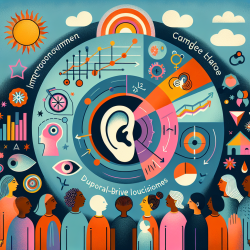Introduction
In the digital age, privacy has become a significant concern, especially in sectors like education where sensitive data is frequently shared. The research paper "Collective Privacy Recovery: Data-Sharing Coordination via Decentralized Artificial Intelligence" offers a groundbreaking approach to addressing privacy issues through coordinated data sharing. This blog will explore how practitioners, especially those in special education, can leverage these insights to enhance their data-sharing practices while safeguarding privacy.
Understanding Coordinated Data Sharing
The research highlights the concept of coordinated data sharing as a means to recover privacy. Traditionally, data sharing has been a balancing act between maintaining privacy and ensuring the quality of online services. However, the absence of a collective arrangement often leads to privacy compromises. The study proposes a decentralized AI system that automates and scales up the coordination of data sharing, ensuring that only the necessary data is shared.
Implementing Decentralized AI in Special Education
For practitioners in special education, adopting a decentralized AI system can be transformative. Here’s how you can implement these findings:
- Data Minimization: Embrace the doctrine of "as little as possible, as much as necessary" to ensure that only essential data is shared. This approach not only protects student privacy but also reduces the risk of data breaches.
- AI-Based Coordination: Utilize AI to coordinate data-sharing decisions. This technology can help in making informed choices about what data to share, with whom, and for what purpose, thus optimizing both privacy and service quality.
- Engage Stakeholders: Involve parents, educators, and therapists in the data-sharing process. By fostering a collective understanding and agreement on data-sharing practices, you can enhance trust and transparency.
Benefits of Coordinated Data Sharing
The implementation of coordinated data sharing offers several benefits:
- Enhanced Privacy: By sharing only necessary data, the privacy of students and their families is better protected.
- Cost Reduction: Service providers can reduce costs associated with data collection and storage by accessing only relevant data.
- Improved Service Quality: With better data coordination, the quality of online therapy services can be maintained without compromising privacy.
Encouraging Further Research
While the study provides a solid foundation for privacy recovery through coordinated data sharing, further research is encouraged. Practitioners can explore how these findings can be tailored to specific educational settings and the unique needs of students with disabilities. Additionally, investigating the long-term impacts of such data-sharing practices on educational outcomes can provide valuable insights.
Conclusion
The research on collective privacy recovery through decentralized AI presents a promising avenue for improving data-sharing practices in special education. By implementing these strategies, practitioners can enhance privacy, reduce costs, and maintain high-quality services. Embracing this innovative approach not only benefits the educational community but also sets a precedent for privacy-conscious data sharing in other sectors.
To read the original research paper, please follow this link: Collective privacy recovery: Data-sharing coordination via decentralized artificial intelligence.










